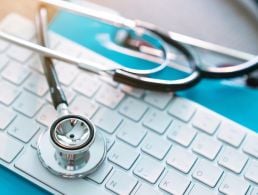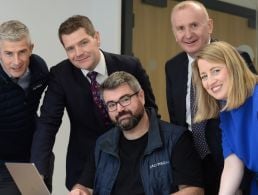Technological progress is set to revolutionise the medical industry. We spoke to Dr Brian McManus, medical director of VideoDoc, about the changes he has observed in his lengthy medical career.
There isn’t a person on Earth that doesn’t come in contact with the medical industry at some point of their lives. It is inextricably linked with the human existence.
Technology is offering some amazing opportunities for advancement in the field of medicine. Not only has the career of medicine been transformed by technology, it will continue to be completely changed and almost be rendered unrecognisable.
Dr Brian McManus is the current medical director of VideoDoc, a company that provides telemedicine services in Ireland. Having been in medicine for more than 20 years, he has observed these transformations in action and is at the forefront of forthcoming changes in the sector.
The key(hole) to unlocking surgical innovation
“The changes I have seen since starting medicine … are enormous,” McManus explained.
“When I started medicine, laparoscopic surgery was in its infancy and there were limited treatment options for many common medical conditions, including many cancers. Now, there are surgeries being done laparoscopically and robotically.
“Procedures can now be performed by minimally invasive interventional radiology, compared to open surgery 20 years ago.”
Technological innovation has helped surgery to make leaps and bounds in progress, reducing healing time and increasing efficacy, and these developments show no signs of slowing down.
Medtech start-up Levita is attempting to further refine laparoscopic cholecystectomy (gallbladder removal) procedures by introducing a magnetic surgical system.
Many of the developments in medicine bolstered by technology seem to indicate a trend of increasing amounts of automation serving to merely complement surgical skill, as opposed to supplant it.
In the case of aforementioned robotic surgeries, such as the da Vinci Xi robotic surgery system, a surgeon’s hand movements are translated into smaller, more precise movements of small instruments inside a patient’s body.
Technological advancement is, evidently, seeping into how surgeons prepare for surgery as well as perform it. In December 2016, doctors in Dubai used a 3D-printed surgical aid to successfully remove a cancerous tumour in the kidney of a 42-year-old woman. The aid helped doctors carefully plan the surgery to make it as minimally invasive as possible, completing the procedure in an hour less than normal.
The potential of telemedicine
As medical director of VideoDoc, McManus is already attempting to promote a new approach to doctors’ visits made possible by improvements in communication technology: telemedicine.
“I think we are just at the tip of the iceberg with telemedicine,” he said.
“At present, we are seeing patients with relatively acute minor illnesses and complaints; currently, they are younger patients who are more comfortable using video technology to hold a consultation. They find the convenience of the service great, and this shows through our patient satisfaction levels at VideoDoc, which are above 94pc.”
This convenience, however, could be beneficial beyond merely being able to access a doctor in a way that doesn’t cut into the nine-to-five work schedule. “As telemonitoring develops, I believe we will be able to manage many chronic diseases through telemedicine.
“There are [already] a number of programmes in the US and Australia where GPs and consultants are offering services to patients in remote areas for the management of their chronic diseases.
“I believe there are many benefits for GPs and patients if their own doctor can see and talk to them via a video consultation. For patients, the further convenience is felt by not having to leave home, find parking, wait in a waiting room full of sick people. For GPs, the benefits include the extra ability to manage elderly patients and avoid unnecessary appointments or even long house calls to remote areas.”
The possibilities presented by telemedicine in virtually bridging the distance between physicians and patients were explored recently in a 2016 paper published by Harvard’s Global Health Delivery Project, which weighed up how effective telemedicine could be at addressing issues of infrastructure, distance and low patient-to-physician ratios, which often result in deaths from preventable disease.
Data-driven health
In Stanford Medicine’s 2017 Health Trends report, the dean of the Stanford University School of Medicine, Dr Lloyd B Minor, concluded that data is “the greatest force behind [emerging health trends]”.
Technological progress has meant that people are not only producing more data, but its availability to clinicians has become much more seamless. In 2013, 153 exabytes (one exabyte = 1bn gigabytes) of healthcare data were produced, a number that is expected to balloon to 2,314 exabytes by 2020.
“Many hospitals, GP surgeries and telehealth providers are computerised, so the records are accessible to other doctors who may also be attending to the patient,” McManus said.
“Past medical history, chronic diseases, allergies and medications are recorded, making it much easier for doctors to develop an understanding of their patient and share that knowledge with other clinicians who need to be aware of it.
“I worked in a number of GP surgeries and none were computerised at that time … it was only a few years ago that I was working as a GP in Fermoy and we faxed a lot of our referrals to consultants.”
New communication and data-collection technologies have vastly improved this service, but the question of how ethical they are is under the microscope. It is said that your medical record is 10 times more valuable on the black market than your credit card, meaning the issue of patient data security is of pressing importance.
Many medical professionals are feeling the effects of the impending enforcement of GDPR, which will leverage heavy penalties for improperly handled data.
“It’s very hard to keep up with all the changes,” McManus admits, “and I feel for a lot of GPs who will have to continue working in their busy practices and try to get a handle on all the regulations at the same time.”




